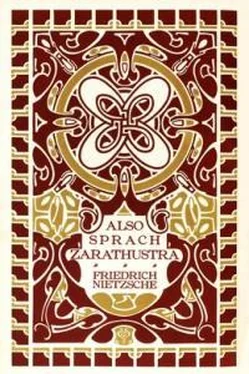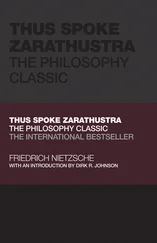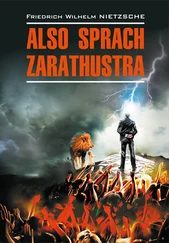In the true man there is a child hidden: it wanteth to play. Up then, ye women, and discover the child in man!
A plaything let woman be, pure and fine like the precious stone, illumined with the virtues of a world not yet come.
Let the beam of a star shine in your love! Let your hope say: "May I bear the Superman!"
In your love let there be valour! With your love shall ye assail him who inspireth you with fear!
In your love be your honour! Little doth woman understand otherwise about honour. But let this be your honour: always to love more than ye are loved, and never be the second.
Let man fear woman when she loveth: then maketh she every sacrifice, and everything else she regardeth as worthless.
Let man fear woman when she hateth: for man in his innermost soul is merely evil; woman, however, is mean.
Whom hateth woman most?—Thus spake the iron to the loadstone: "I hate thee most, because thou attractest, but art too weak to draw unto thee."
The happiness of man is, "I will." The happiness of woman is, "He will."
"Lo! now hath the world become perfect!"—thus thinketh every woman when she obeyeth with all her love.
Obey, must the woman, and find a depth for her surface. Surface, is woman's soul, a mobile, stormy film on shallow water.
Man's soul, however, is deep, its current gusheth in subterranean caverns: woman surmiseth its force, but comprehendeth it not.—
Then answered me the old woman: "Many fine things hath Zarathustra said, especially for those who are young enough for them.
Strange! Zarathustra knoweth little about woman, and yet he is right about them! Doth this happen, because with women nothing is impossible?
And now accept a little truth by way of thanks! I am old enough for it!
Swaddle it up and hold its mouth: otherwise it will scream too loudly, the little truth."
"Give me, woman, thy little truth!" said I. And thus spake the old woman:
"Thou goest to women? Do not forget thy whip!"—
Thus spake Zarathustra.
XIX
The Bite of the Adder.
One day had Zarathustra fallen asleep under a fig–tree, owing to the heat, with his arms over his face. And there came an adder and bit him in the neck, so that Zarathustra screamed with pain. When he had taken his arm from his face he looked at the serpent; and then did it recognise the eyes of Zarathustra, wriggled awkwardly, and tried to get away. "Not at all," said Zarathustra, "as yet hast thou not received my thanks! Thou hast awakened me in time; my journey is yet long." "Thy journey is short," said the adder sadly; "my poison is fatal." Zarathustra smiled. "When did ever a dragon die of a serpent's poison?"—said he. "But take thy poison back! Thou art not rich enough to present it to me." Then fell the adder again on his neck, and licked his wound.
When Zarathustra once told this to his disciples they asked him: "And what, O Zarathustra, is the moral of thy story?" And Zarathustra answered them thus:
The destroyer of morality, the good and just call me: my story is immoral.
When, however, ye have an enemy, then return him not good for evil: for that would abash him. But prove that he hath done something good to you.
And rather be angry than abash any one! And when ye are cursed, it pleaseth me not that ye should then desire to bless. Rather curse a little also!
And should a great injustice befall you, then do quickly five small ones besides. Hideous to behold is he on whom injustice presseth alone.
Did ye ever know this? Shared injustice is half justice. And he who can bear it, shall take the injustice upon himself!
A small revenge is humaner than no revenge at all. And if the punishment be not also a right and an honour to the transgressor, I do not like your punishing.
Nobler is it to own oneself in the wrong than to establish one's right, especially if one be in the right. Only, one must be rich enough to do so.
I do not like your cold justice; out of the eye of your judges there always glanceth the executioner and his cold steel.
Tell me: where find we justice, which is love with seeing eyes?
Devise me, then, the love which not only beareth all punishment, but also all guilt!
Devise me, then, the justice which acquitteth every one except the judge!
And would ye hear this likewise? To him who seeketh to be just from the heart, even the lie becometh philanthropy.
But how could I be just from the heart! How can I give every one his own! Let this be enough for me: I give unto every one mine own.
Finally, my brethren, guard against doing wrong to any anchorite. How could an anchorite forget! How could he requite!
Like a deep well is an anchorite. Easy is it to throw in a stone: if it should sink to the bottom, however, tell me, who will bring it out again?
Guard against injuring the anchorite! If ye have done so, however, well then, kill him also!—
Thus spake Zarathustra.
I have a question for thee alone, my brother: like a sounding–lead, cast I this question into thy soul, that I may know its depth.
Thou art young, and desirest child and marriage. But I ask thee: Art thou a man ENTITLED to desire a child?
Art thou the victorious one, the self–conqueror, the ruler of thy passions, the master of thy virtues? Thus do I ask thee.
Or doth the animal speak in thy wish, and necessity? Or isolation? Or discord in thee?
I would have thy victory and freedom long for a child. Living monuments shalt thou build to thy victory and emancipation.
Beyond thyself shalt thou build. But first of all must thou be built thyself, rectangular in body and soul.
Not only onward shalt thou propagate thyself, but upward! For that purpose may the garden of marriage help thee!
A higher body shalt thou create, a first movement, a spontaneously rolling wheel—a creating one shalt thou create.
Marriage: so call I the will of the twain to create the one that is more than those who created it. The reverence for one another, as those exercising such a will, call I marriage.
Let this be the significance and the truth of thy marriage. But that which the many–too–many call marriage, those superfluous ones—ah, what shall I call it?
Ah, the poverty of soul in the twain! Ah, the filth of soul in the twain! Ah, the pitiable self–complacency in the twain!
Marriage they call it all; and they say their marriages are made in heaven.
Well, I do not like it, that heaven of the superfluous! No, I do not like them, those animals tangled in the heavenly toils!
Far from me also be the God who limpeth thither to bless what he hath not matched!
Laugh not at such marriages! What child hath not had reason to weep over its parents?
Worthy did this man seem, and ripe for the meaning of the earth: but when I saw his wife, the earth seemed to me a home for madcaps.
Yea, I would that the earth shook with convulsions when a saint and a goose mate with one another.
This one went forth in quest of truth as a hero, and at last got for himself a small decked–up lie: his marriage he calleth it.
That one was reserved in intercourse and chose choicely. But one time he spoilt his company for all time: his marriage he calleth it.
Another sought a handmaid with the virtues of an angel. But all at once he became the handmaid of a woman, and now would he need also to become an angel.
Careful, have I found all buyers, and all of them have astute eyes. But even the astutest of them buyeth his wife in a sack.
Many short follies—that is called love by you. And your marriage putteth an end to many short follies, with one long stupidity.
Your love to woman, and woman's love to man—ah, would that it were sympathy for suffering and veiled deities! But generally two animals alight on one another.
Читать дальше











